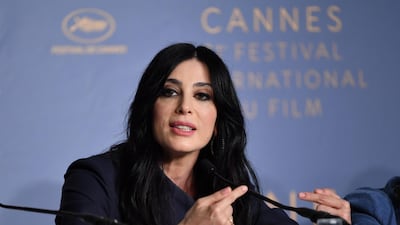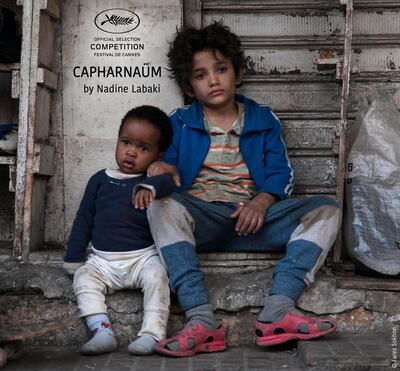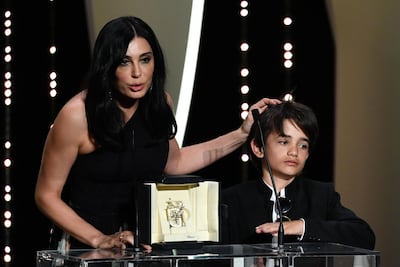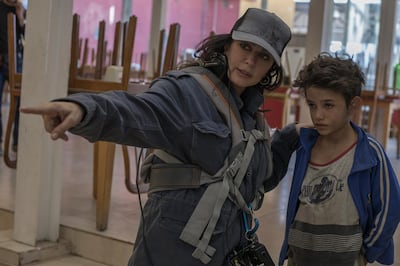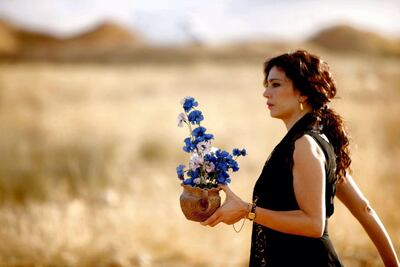Lebanese director Nadine Labaki made history last week as the first female Arab director to win a major prize in competition at Cannes, picking up the Jury Prize for her emotional story of the lives of Lebanon's forgotten street kids, Capharnaum . The win was a significant milestone for at least three groups – it put Arab cinema firmly centre stage on a global scale. It also struck a blow for female film makers in the wake of #MeToo movement . Finally and most importantly, it helped raise the profile of the world's impoverished children – not just refugees. Labaki is at pains to point out, but also kids who are born into poverty and simply have no record of their own existence. Labaki is in no doubt which of these groups should take greatest pride from the award.
“It’s a win for all the people who are in the film, with their lives, all their sufferings and the problems they’ve been through,” she says. Most of the film's cast are genuine street children Labaki met in Beirut during the two years she spent researching the film, and she is pleased to dedicate its success to them: “Really, everyone in the film is expressing their own situation and for me that’s the most significant victory. A few days ago these people didn’t exist, literally. Most of them don’t even have papers to prove their existence, so all of a sudden to shed light on them and their situation, everybody’s talking about them and recognising their talents, that’s a huge achievement.”
The film covers a hugely emotive topic, no doubt, a part of the reason it received a 15-minute standing ovation from a tearful audience at its Cannes premiere last week, and Labaki is hopeful that audiences won’t forget what they have seen when they walk out of the theatre: “The aim is for the film not to just stop at the boundaries of being a film, but to go on and implement change,” she says. “That was always the aim of it. I might be a bit naïve but I think people will look at these people in a different way when they come out of the theatre. A lot of people have said to me since ‘do you know, I stopped and talked to one of them.’ To me that’s the beginning of the change. Even if it’s naïve that’s what I’m hoping for. I want it to become more than just a film. I think sometimes we turn our heads and close our eyes because it’s too big a problem and we feel helpless, and I hope this film can be the start of a change to that.”
As for Arab cinema, Labaki admits that with her own win and Ziad Doueri's latest Oscar nomination for The Insult, we're in a good place right now, and she says that some of that comes down to the regions political significance: "There's a lot of interest in cinema from this part of the world because it's almost like the future of the world is being decided in the Middle East right now," the director asserts. "There are a lot of interesting things to talk about, and more and more filmmakers expressing their point of view. I think when you come from this part of the world you feel a certain responsibility because of where you come from, and you need to express yourself as an artist not just a film maker, and art cannot be dissociated from politics. We need alternative societies and alternative systems and we need art to help us think about all this. So it's only normal that films from this part of the world are very interested in this sphere. We're really on the map at the moment."
Labaki is back in her native Lebanon now, alongside the film’s star, 12-year-old Syrian refugee Zain Al Raffea, who accompanied the director on her Cannes adventure. The director says her young colleague was rightly proud of the film’s success, though she says he was utterly unfazed by the glitz and glamour surrounding it, perhaps unsurprisingly given his background: “He’s a tough kid; he’s seen so much in his life that all this is nothing,” she says. “He’s happy, of course, but it stops there. His life is not easy and that’s what we need to start looking at. All the kids in this film have very difficult lives and that’s what we need to start thinking about. How can this film really make a change in these kids’ lives?”
For that to happen, Labaki says, we all need to sit up and take notice: “I’m not the only one responsible for that, I can’t be,” she says. “It needs to be a collective effort. For all the good intentions I had, I wasn’t able to get them out of the streets. That’s all I was thinking of while I was there. I was in Cannes celebrating cinema and celebrating life, but I know their day wasn’t easy, and I couldn’t help feeling a bit guilty for being happy. You’re torn. ‘How should I be feeling? What should I be feeling at this moment?’ The film asks these kind of questions, and I don’t know what will happen when the film is shown, but it needs to be more than a film and I really hope that’s what we see happen.”
Of course, Labaki may hope the film can help act as a catalyst for change in the lives of the street kids and refugee children she met while making it, but there’s no denying that the huge boost to her profile from winning at Cannes will also effect change on her own career.
Can we expect to see Labaki popping up at the helm of the next Marvel blockbuster? “It’s very tempting. Of course, I’ll see what Hollywood has to say,” she says. “I don’t think I’ll be doing a Marvel movie because it’s just not my thing, but if I see a script that I relate to, that fits in with the way I see the world, then why not? It all just depends on the script and what life is going to bring. Right now, everything is still just too overwhelming, I’m still absorbing what’s happening to me. There’s been no serious offers yet, but I’m just taking it all in and we’ll see what comes.”
Nadine Labaki – her career to date
1990: Labaki launches her career directing music videos, for which she wins an award on the popular Lebanese talent show Studio El Fan. The videos are notable for their cinematic quality, as well as for their sometimes sexually provocative nature. Labaki continues to direct videos for the show through to its ending in the early 2000s after a four-decade run on Lebanese screens.
1997: Labaki graduates from Beirut's St Joseph University. She is unusual among the Lebanese film making community in that she did not study abroad. Her graduation film, 11 Rue Pasteur, won the Best Short Film Award at the Biennale of Arab Cinema at the Arab World Institute in Paris.
1998: Labaki attends a workshop in acting at the Cours Florent in Paris. She will go on to appear in many of her own, as well as other directors’, productions as well as directing. She also begins to direct adverts alongside her ongoing music video work.
2003: Labaki begins directing music videos for Lebanese star Nancy Ajram, including her most famous work of this era, the 2003 video for Ajram's Akhasmak Ah (I'll Taunt You). The video aligns Ajram with the Egyptian actress Hind Rostom, "the Marilyn Monroe of Egyptian cinema," and won plenty of fans, particularly in Egypt, as a result. The video also attracted criticism, however, thanks to Ajram's revealing dress and provocative dancing. Palestinian poet Tamim Al Barghouti was among the critics, accusing Arabic pop videos of submitting to Western style in an article in Lebanon's Daily Star.
2005: Labaki takes part in the Cannes Film Festival Residence for six months. During that time, she writes Caramel, her first feature film, which she will go on to direct and star in. The film showcases a Beirut that most people are not familiar with. Rather than tackle political issues, she presents a comedy that deals with five Lebanese women who gather at a beauty salon and deal with issues related to love, sexuality, tradition, disappointment, and everyday ups and downs.
2007: Caramel premiered at the Directors' Fortnight at the Cannes Film Festival. It sold worldwide and collected prizes at many festivals around the world, garnering Labaki acclaim both as a director and actress. It also put her on Variety's 10 Directors to Watch list at the Sundance Film Festival.
2008: The French Ministry of Culture and Communication awards Labaki the Insignia of Chevalier in the Order of Arts and Letters.
2011: Labaki's second feature, Where Do We Go Now? premieres in the Un Certain Regard section at Cannes. The film humourously tackles religious tension in a village where a church and a mosque stand side-by-side. It will go on to win the Cadillac People's Choice Award at the Toronto International Film Festival and pick up awards at festivals including San Sebastián International Film Festival and Stockholm Film Festival. The film is also nominated for best foreign film at the Critics' Choice Awards in Los Angeles.
2014: Labaki sits alongside Lee Daniels on the judging panel for the Dubai International Film Festival's Muhr Awards, and also takes time off to hit the red carpet for the regional premiere of Xavier Beauvois' The Price of Fame, in which she stars. She'll put the judging experience to good use a year later, when she's selected to join the panel for Cannes' Un Certain Regard section.
2018: Capernaum picks up the Jury Prize in Cannes' main competition and receives a 15-minute standing ovation at its premiere. Is Labaki's career about to go stellar?
______________________
Read more:
Nadine Labaki makes Cannes history as first female Arab filmmaker to win major prize
Cannes hands out penultimate night awards
Stars protest Gaza deaths at Cannes Film Festival
______________________
